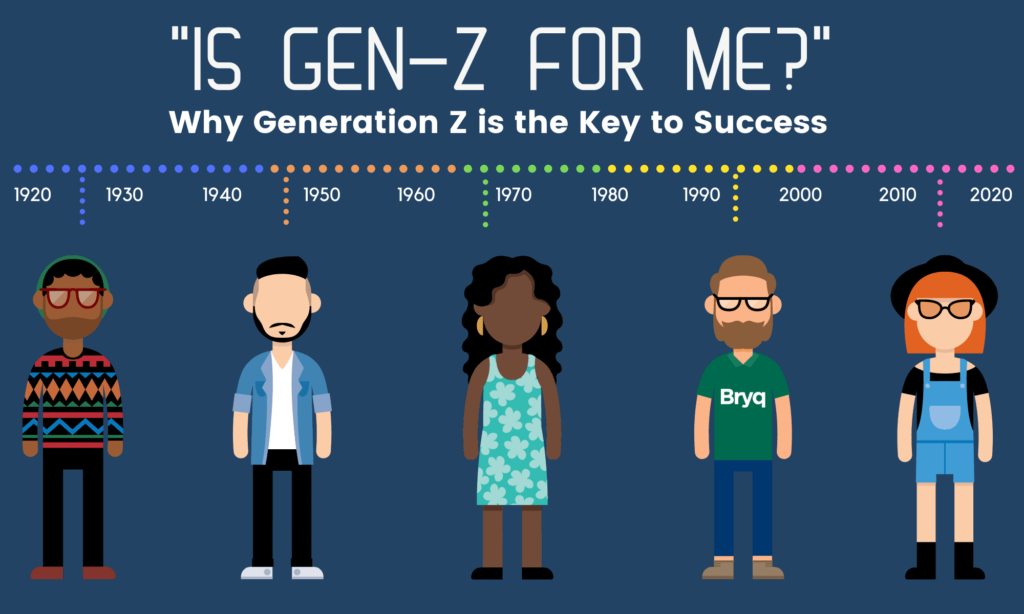Gen Z Doesn’t Want Crappy Jobs!
The silliness of "generations."

Business Insider/YahooNews (“Gen Z isn’t ashamed of ‘job-hopping’ and will even quit unfulfilling jobs without a backup plan, study finds“):
Gen Zers don’t share older generations’ hang-ups about “job-hopping”, according to a new study by management consulting firm Oliver Wyman.
They’re happy to ditch unfulfilling jobs that don’t offer the perks they want — and are always on the lookout for something better. Indeed, 70% of Gen Zers who say they’re “loyal” to their employers are either actively or passively seeking a new job, the research found.
Oliver Wyman surveyed 10,000 Gen Zers aged 18 to 25 in the US and the UK in an attempt to analyze how “the largest and most disruptive generation ever” will affect long-established business practices.
People born between 1997 and 2012, often called Gen Z, came of age during the pandemic. Having lost much of their youth to COVID-19, they’re seeking a sustainable work-life balance, and are not prepared to sacrifice leisure time to climb the corporate ladder, according to the research.
More than previous generations, they’re even prepared to jump ship without a backup plan, the survey found.
Gen Z views work in “a more transactional manner” than previous generations, and has a “lengthy list of demands,” per Oliver Wyman’s study. In particular, they want jobs that include benefits such as comprehensive healthcare coverage and mental health support, as well as institutional transparency.
They’re also increasingly demanding flexibility — and they’re prepared to quit if they don’t get it. Many of them started working during the pandemic, when most offices were shuttered, so have “no interest in soul-sucking commutes,” respondents said.
According to Oliver Wyman’s poll, 85% of Gen Zers prefer a hybrid or remote work pattern.
This means that employers seeking to recruit and retain Gen Z workers need to let employees work from home, have more time off and show that they support diversity, Oliver Wyman’s research found.
I never cease to be amused by silly “generations” research, especially when it comes to trend spotting among nascent cohorts.
It’s certainly true that particularly catastrophic events can create effects on those at an especially impressionable age. Those who grew up during the Great Depression, fought in World War II or Vietnam, got out of school just as the Great Recession hit, were teenagers on 9/11, or had to home-school during COVID had or can be expected to have some things in common as a result.
But Gen Z is still incredibly young. Indeed, my two daughters, born in 2008 and 2011, and my three stepchildren, born in 1999, 2000, and 2003, are all within its parameters. All five had their schooling disrupted by the pandemic. But I suspect it’ll be less life-shaping for my 11-year-old, who was in 3rd grade when schools shut down, than for the 23-year-old, who was finishing up her junior year in college and had to move in with us during the pandemic.
It does, though, stand to reason that those who started their working lives during a long period of remote work will feel entitled to continue working remotely. But, again, that’s just the old end of that demographic. Four of my five Gen-Zers have yet to enter the full-time workforce. And, of course, we’ll have to see how the economy shapes itself in the coming years. Right now, employees are in a much better position to demand things than has been the norm.






Kha. The same “insights” are recycled again and again.
AKA: young persons have aspirations, often not well informed or anchored, and as with all humans, distorted by recency biais.
Of course Consultancies research is generally utter tripe with zero rigour but quite a lot of Motivated Reasoning to sell something they want to sell.
Isn’t it weird how corporate behavior of the last few decades – squeezing every dollar out of their workers, giving them 29 hours per week to avoid benefits, fighting for lower minimum wages, working to remove “job-killing regulations” that make people safer on the job, and laying people off even while buying back stock – has resulted in lower loyalty from their workers?
Science just can’t explain it!
The generational blocs are our version of horoscopes.
Yes, I know it isn’t rooted in pure superstitious hokum like constellations, but it’s filled with similar sorts of broad generalizations, and the divisions are pretty arbitrary and lump a lot of people with very different generational experiences together. (Example: Technically Kamala Harris, having been born Oct. 1964, is part of the “Baby Boom” generation along with Trump and Dubya and Clinton. People who came of age during Vietnam and the Beatles and the big assassinations are placed in the same category as someone who saw Reagan elected before her senior prom.)
The critiques of the newer generations are always just a version of “kids these days.” You find a lot of the same beats previously said about the millennials, Gen-X, and the Boomers.
And frankly, I have the sense that one of Gen-Z’s biggest contributions will be abandoning the whole generation silliness altogether. I increasingly hear the word “boomer” used simply to mean “someone who sounds old and out of touch” (that’s the “Okay boomer” meme), regardless of whether they’re actually from the Boomer generation–I’ve heard it applied to millennials and even Gen-Z people.
@Kylopod
Exactly. The initial “Baby Boom” idea made sense in that there was literally a huge spike in births in the early years after WWII. There has long been talk of cuspers at the tail ends of generations but Generation Jones, which accounts for people like Harris (tail end of the Baby Boom) and me (front end of Gen X), is the only one that seems to have a name that has stuck.
Yes, although one should allow not always just Kids These Days, as the photo-negative of “kids these days” is also present, that is new generation as (more usually Left version) kind of noble savages against which supposed error is contrasted, although as photo negative of the Kids These Days, the mythification-idealisation is reversed.
But either way, the analytical quality and utility of a horoscope.
@James Joyner:
I’m a cusper myself, having been born in 1977, on the border between Gen-X and Millennial. I’ve seen this bloc variously called Xennials and the Oregon Trail Generation, but there doesn’t appear to be any consensus on when it begins and ends (it could be early as 1975 and as late as 1983, which seems overly broad to me).
@Lounsbury: There are always specific things that make each generational critique seem unique on the face of things, even if the overall themes are similar. The Silent Gen said to the Boomers, “You don’t know what it was like to live through WWII.” The Boomers said to Gen X, “You don’t know what it was like to live through the tumultuous ’60s” (even though Gen-X begins in the ’60s). (The Gen-Xers also seem to be the one generation to be stereotyped as cynical.) Late-millennials and Gen-Z have grown up with the Internet and social media, which I think underlies a lot of the depiction of them by older folks as spoiled by the modern age.
@Kylopod: Of course, there are real specificities over time given economic and social change from real material change, but the general complaint recipies either way, from Left or Right or ostensibly apolitical, remain fundamentally the same. (as a GenX in this rubric I certainly recall and recognise rather similar things said of ‘my generation’ in the 20s age cohort period, although the pretended motivating details are swapped out)
Well we are in agreement of course, my only addition was there is a sub-aspect of bagging on the young-adult generational cohort is an idealisation of them to critique something current – a photonegative – but remaining fundamentally the same analtyical error.
As for generation theories, I much prefer Strauss-Howe. It too fails on the “rigour” dimension. But it makes up for it with the incorporation of archetypes. And who doesn’t love a good archetype?! It’s also much grander in scope, which makes for more enjoyable and enriching engagement. ymmv
But the best aspect of this theory is that it inspired the play Heroes of the Fourth Turning by Will Arbery. Set in Lander WY (hey Jax). Fair warning: I suspect that many of the OTB crowd will find the characters rather confronting. The production that I saw was very well done.
If genZ ends the generational thing. Where will us genXers get our memes from? 😉
The whole generational thing seems like nonsense to me. “Boomers” are defined as anyone born between 1945 and 1980 or even later? What the heck kind of sense does that make? The kids born in 1980 were the children of those born in ‘45. For the extreme outliers, they were the grandkids! I was born in late 1960 and I never felt like the Beatles generation. Men born in 1945 lived with the sword of the Vietnam Draft hanging over their head, but that ended in 1973, when I was 12 years old. I was 7 when the assasinations, the Democratic Convention riots, and the legal LSD experimentation was going on. By the time I was graduating high school the hippies were a joke, there were no riots on campus (at least none unrelated to sports) and fewer in the streets than we have now.
I think it is useful to group people with their birth cohort, but I feel the Chinese method makes a lot more sense. The refer to “the 70’s”, “the 80’s”, “the 90’s”, etc
and limit it to people born in that decade.
@MarkedMan: Whoops. Left out my very important first sentence. It should have started, “I recently heard a discussion among some young people about what constituted Baby Boomers and they agreed it was anyone born after WWII and who was an adult before the turn of the century.”
@MarkedMan:
Where’d you get that from? I’ve heard conflicting definitions of where each bloc begins and ends, but I’ve never heard anyone cite Baby Boom as 1945-1980. (That’s separate from the whole “ok boomer” business, where the word isn’t really being used to describe a generational bloc at all, it’s just used to mock people who are perceived as old and out-of-touch.)
I do agree, though, that much of it is nonsense.
@Mimai: Sounds interesting. I’ll keep an eye out to see if it is staged in my area.
@Kylopod: Sorry, my bad. I left something out. See my addenda below my first comment.@MarkedMan:
No edit button for me today.
I saw a meme the other day that this piece reminds me of:
At age 18 you hear “go to colleg eor you’ll wind up flipping burgers”
At age 22 when you can’t find a job in your field, you hear “What, flipping burgers is not good enough for you?”
At age 25 when you’re drowning in student loan payments, you hear “You want to be paid that much for flipping burgers?”
@MarkedMan: In Korea, generations appear to have been identified by what was happening while a person was high school to college aged. Most of my adult students were part of the 8086 generation after the idea that computers were becoming ubiquitous. A slightly younger cohort was identified by many of them being part of the student riots in the late 80s–not quite 10 years later.
The saddest one was that the generation who were going to university while I was teaching were identified as the 880 generation–for the maximum number of thousand won (about $1) that minimum wage jobs paid, a tribute to the stagnation of the time that was finding college graduates struggling along in low-wage, dead-end jobs. (Hmmm… this seems like something I’ve been reading about recently, but I can’t place it. 🙁 )
@MarkedMan:
1946-1979 (or 83 depending on what one counts as “an adult”)? Seems wide to me, but I suppose that it would depend on the basket of commonalities one looks at.
One thing I’ve noticed about a lot of the newer hires at my work place that’s increasingly starting to weird me out is how many of them seem to say display a complete lack of initiative.
If you give them a task that has step-by-step instructions, they’ll do great, but anytime there’s any sort of judgement or creativity involved they just completely lock up. And more, it’s not like it used to be where if someone got stuck, they’d go to a more experienced co-worker and ask questions or for help to figure out the next step, they basically just stop completely until someone else notices they’ve stopped working and comes to tell them what to do next.
As an example, if we’re testing software you can give them a procedure for running tests and what the expected results are and if the test passes everything is fine, but if the results are not what is expected, they want a step-by-step instruction for diagnosing every possible thing that could be wrong instead of any sort of ability to develop theories and then go test that theory.
My suspicion is that this is a result of “over-regimentation” by parents and education leaving them unable to function in situations where someone is not constantly telling them what to do.
@MarkedMan: @Just nutha ignint cracker: Boomers are pretty much standardized as 1946-1964. Gen X is almost universally from 1965-1979 and Millenials 1980-late 1990s (usually 1997 or 1998), with Z there to 2012 or so. They tend to firm up later and be a bit vague early.
@Stormy Dragon: I hate this about myself, but I don’t often hire people right out of college unless they have done multiple internships with us, and what you describe is exactly the reason why. But I’m not sure that it has changed that much over the years. I hire engineers (so way above minimum wage!) and while there are a few schools that require real world job experiences as part of graduation requirements, for the most part kids are clueless. I noticed this right when I started working and compared the new engineers coming from the coop/internship schools to all the others. One thing they have gotten worse at is just basic job skills, and understanding what is expected of any employee. Fewer and fewer of them have had any type of a job at all before they are thrust into the workplace. 15 years ago a grad student was doing an internship with my group and when I asked her to research the best way of doing something she asked me how many references I wanted her to check. It took me a few minutes to understand that she was referring to some kind of minimum requirement a professor would give them for an assignment. I replied that she needed to keep going until she was sure she understood all the issues and therefore would be confident in her recommendation. I could tell this sort of shattered her view of the universe and caused her agita. There wasn’t a readily measurable criteria that would grantee an “A”. (I don’t think it was my forbidding nature that gave her the agita. Despite how I might come across here, I have received a lot of feedback over the years that I am a kind and patient boss, if a bit relentless. She hadn’t made it to the “relentless” part yet.)
She also was ill a couple of time and her mother called her in sick. She was 25 years old. That shattered MY view of the universe, although I realized that was just a cultural difference and had nothing to do with whether she would eventually become a good employee.
@James Joyner: If I were going to come up with generational signifiers they would be much narrower and some would be simultaneous or overlap and which you were in would be dependent on your lived experience. World War I/Influenza. Flapper generation. Great Depression. Jim Crow. World War II. Beatnik/Hippy. Vietnam Draft. Civil Rights. And then… not sure, until the Trump generation, where the whole f’ing country went completely insane.
@MarkedMan: Reaganomics. BBS/early internet. 9/11. Smartphones/rise of the tech megacorps. Trump.
I only have one employee, my daughter, who is GenZ and honestly she’s outperformed. In fact, she’s indispensable.
I have another way to look at generations: Radio, Movie, TV, Computer and iPhone. We are on about the third generation of People Of The Screen, with each new generation experiencing less of the real world and more of the world as seen through screens. Friends used to be corporeal. Family used to be in close proximity. Work and workplace relationships happened in meat space.
If what you experience is 70 or 80 or 90% via one screen or another, you’re not seeing reality, just an interpretation of reality. Fiction of one type or another, games, or phony ‘reality’ shows, packaged news. Now we’re in a world where children of the screen are getting the output of a previous screen generation, and they of yet an earlier screen generation.
@Michael Reynolds: Interesting. I’ve long thought that as the technology and social structures change it advantages some and disadvantages others. At one point all we needed to know about John Henry was that he was a steel driving man, hard working and strong and that gave him immense social value – until one day it didn’t. Your comment about the screens made me realize that once you get beyond college, your ability to be charming and funny in little snippets of conversation probably has immense impact on your mating success (because of dating apps). Even 20 years ago, it meant close to nothing.
@Kylopod: “The Silent Gen said to the Boomers, “You don’t know what it was like to live through WWII.” ”
I think the Depression had even more effect on the Silents than WW2. At least on a certain portion of the generation…
@Lounsbury: “there is a sub-aspect of bagging on the young-adult generational cohort is an idealisation of them to critique something current – a photonegative – but remaining fundamentally the same analtyical error.”
Yeah, it’s really the same set of ideas but presented one way or the other depending on whose clicks they’re looking to attract.
@Tony W: I’m 54 and have a pension, which has encouraged me to stick around in my job for going on 30 years. How many people even know what a pension is anymore? 401k’s certainly encourage job-hopping.
@reid: I too have earned a small pension from a short stint in State Government, which I can start collecting once I reach age 65. The formula is something like 2% of your monthly wage, per year of service – calculated on your highest-paid 5 years, with a 30-year cap (60% of your pay).
The higher-paying private-sector job at a huge company lured me away from the promise of a pension, and I am honestly grateful for it. I would not have been able to retire early and would probably have logged a similar 20-25 years with the state. Due to an unequal mix of very modest financial brilliance and incredible luck, the 401k has actually grown larger in just a decade or so than the pension ever would have.
So, I now comment on OTB instead of contributing to the world in a more useful way.
@MarkedMan:
THANK you. And also James for Generation Jones. I have never understood how I’m supposed to be in the same freaking generation as my literal parents.
I think you divide Boomers out by when the retirement age went up/which birth years got grandfathered in. Those born in 62 – grandfathered. 64? NOPE.
@MarkedMan: I’m technically a Boomer, but I look at that and say, “no, I’m not your stereotypical Baby Boomer. People of my age are the younger brothers and sisters of our rebellious “Woodstock” elders–and our parents were so freaked out by what our older brothers and sisters did that they clamped down twice as hard on us.”
So our music is different, our psychology is different, and I’m damned sick and tired of people saying that I’m benefiting as a “Baby Boomer”. It’s our older brothers and sisters that got the pension plans and the full Social Security payments. We’re the ones getting the cuts and the truncation of the services, but are being told about it late enough that we don’t have the time to fix our retirement plans (which we need RIGHT NOW).